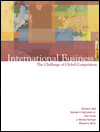Remember some of the regional or cultural differences in labor conditions we shall present.
a. The Japanese jobs-for-life culture is changing.
b. There is still a huge wage gap between the neighboring countries of Germany and Poland.
c. The International Federation of Free Trade Unions estimates there are 250 million child (between 4 and 15 years old) laborers, mostly in the developing countries.
d. Labor conditions in the PRC are reportedly very bad.
e. ICs from developed countries must adjust their labor practices to succeed in developing countries. Understand why some economies are better at job creation than others, which causes differing unemployment rates.
The United States has created many more new jobs than has Western Europe and some more than has Japan since 1980. Europe’s sluggish job creation is blamed by the OECD and McKinsey Management Consultancy on high minimum wages, generous unemployment benefits, restrictive employment protection laws, and product market barriers. Understand the difficulties of finding qualified executives for international companies (ICs) and the importance of foreign language knowledge.
Knowledge of a people’s language is essential to understand its culture and to know what’s going on, as every effective manager must. Compare home country, host country, and third country nationals as IC executives.
Sources of IC executives may be the home country, host countries, or third countries, and their differing culture, language, ability, and experience can strengthen IC management. Realize the growing role of women in international business.
Women are increasingly important as IC executives and are being transferred, with trailing spouses, by their employers both domestically and internationally. Realize the increasing importance of accommodating the trailing spouse of an expatriate executive.
The growing prevalence of two-career families is complicating problems of accommodating the spouse of an executive who is being transferred to another country. Remember some of the complications of compensation packages for expatriate executives.
Expatriate manager compensation packages can be extremely complicated. Among other sources of complication are fluctuating currency exchange rates and differing inflation rates. Basic elements of those packages are salaries, allowances, and bonuses. | 



 2002 McGraw-Hill Higher Education
2002 McGraw-Hill Higher Education